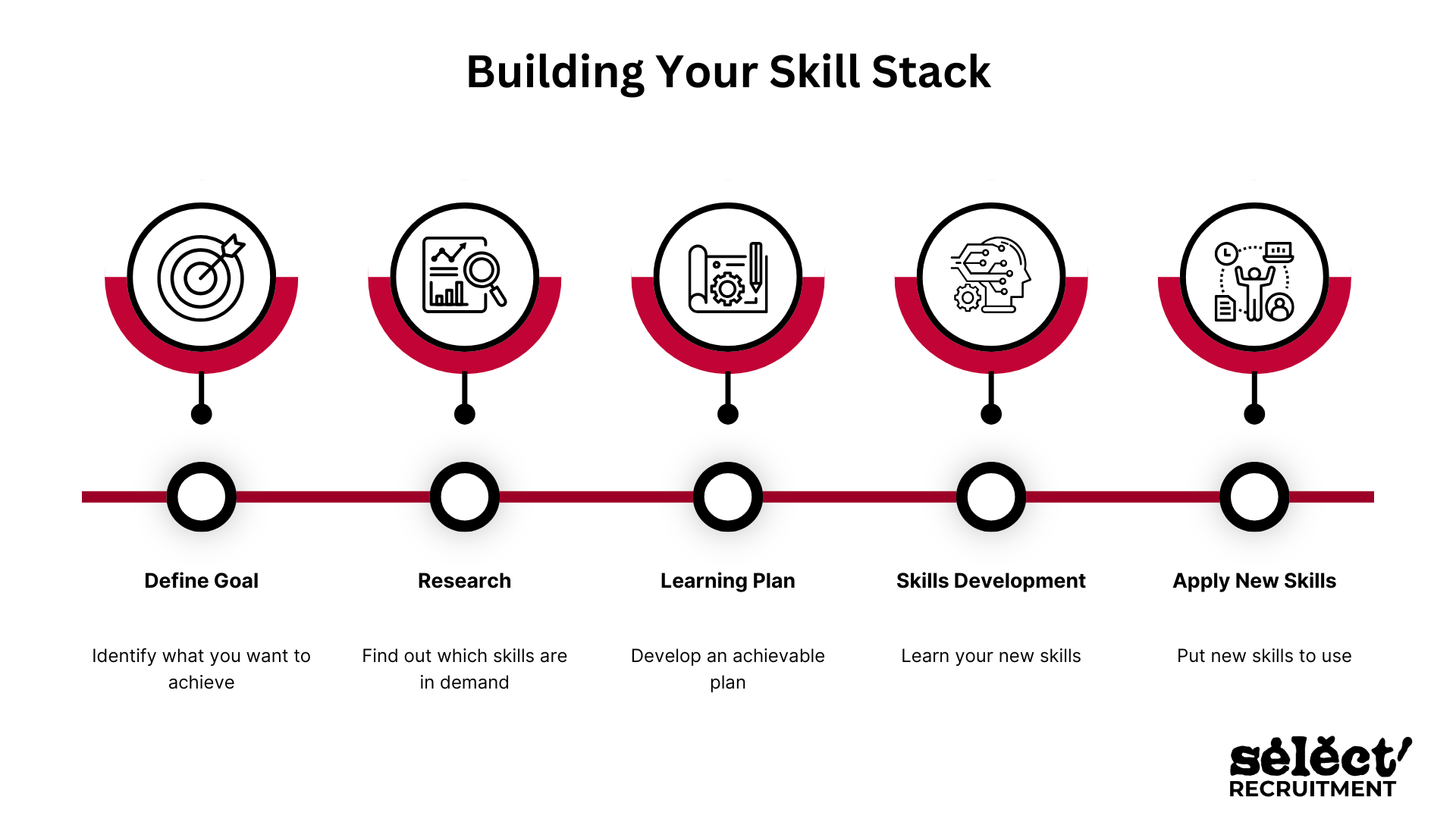As I meet candidates day after day, I'm seeing a clear trend: those who strategically combine complementary skills are the ones landing the most attractive offers.
Recently I worked with a candidate in the property industry that changed disciplines within the sector thanks to upskilling, moving from a property management and administration role into a sales leadership position. The candidate had studied marketing techniques and strategies, and combined with their existing skillset, was able to progress their career in a whole new direction.
What is Skills Stacking (And Why It Works)?
Skills stacking isn't just about collecting random certifications. It's about strategically layering complementary capabilities that create unique value. Think of it like building a professional LEGO structure – each brick adds stability and creates something more impressive than the individual pieces.
I'm seeing this play out in real time, professionals with well-thought-out skill combinations are commanding higher salaries than their single-specialty counterparts. This trend is particularly strong in sectors like fintech, where understanding both financial services and technology creates a powerful combination.

Identifying Your Foundation Stack
Before you start adding new skills, it's crucial to understand your current foundation. I often advise candidates to follow this process:
List your core expertise and the tools you use daily
Identify which of your skills consistently receive positive feedback
Research how your industry is evolving (I recommend following key thought leaders on LinkedIn)
Look for gaps where additional skills could create unique value
High-Value Skill Combinations for 2025
Based on my recruitment experience, these skill combinations are proving particularly valuable:
Data Literacy + Industry Expertise:
Financial analysts who can code are highly sought after
HR professionals who understand people analytics are in high demand
Marketing managers who master data visualisation tools stand out
Technical Skills + Project Management:
DevOps engineers with Agile certification are particularly sought after
Business analysts who understand both technical requirements and stakeholder management
Digital Marketing + Analytics:
Content creators who understand SEO and data analysis
Social media managers who can interpret performance metrics and adjust strategy accordingly
Building Your Personal Skills Stack
Here's the practical approach I recommend to my candidates:
Starting with a clear goal is essential. You'll want to first identify specific roles you're targeting in your industry. Once you have these in mind, dive deep into researching the skill requirements in relevant job descriptions.
I always advise my candidates to look for patterns in high-paying positions - this helps identify which skills consistently command premium salaries in your field.
Creating a learning plan is your next crucial step. I've seen remarkable success with candidates who commit to the 'power hour' approach - dedicating one hour before work each day to focused learning. Take advantage of platforms like Coursera, LinkedIn Learning, or industry-specific training programmes to structure your learning journey.
Don't forget to join professional communities where you can learn from peers - I've seen countless candidates accelerate their growth through these networks.
Finally, you need to apply your skills in real scenarios - this is where theory meets practice. Look for opportunities to volunteer for projects that will put your new skills to the test. Consider creating side projects that demonstrate your growing capabilities.

Throughout this journey, document your learning process and outcomes - this creates a powerful narrative for future job applications. I've seen candidates use this documentation to great effect in interviews, showing potential employers their proactive approach to professional development.
How to Market Your Skills Stack to Employers
From a recruiter's perspective, here's how to showcase your skill stack effectively:
Create a skills matrix showing how different abilities complement each other
Include specific examples of projects where you've combined multiple skills
Quantify results where possible
Prepare stories that demonstrate how you've used combined skills to solve problems
Show how your unique skill combination adds value to the role
Be ready to discuss your learning journey and future skill development plans
Looking Ahead
As we start the new year, I'm seeing the demand for skilled professionals who can combine different capabilities grow exponentially. The future belongs to those who can adapt and build unique skill combinations that solve complex problems. Start building your skill stack today, and position yourself for success in 2025 and beyond.
Ready to explore how your skill stack could open new career opportunities? At Select Recruitment, we specialise in matching professionals with roles that maximise their unique skill combinations.
Get in touch with our team today to discuss your career goals and discover positions that could benefit from your expanded skill set.
Author:




